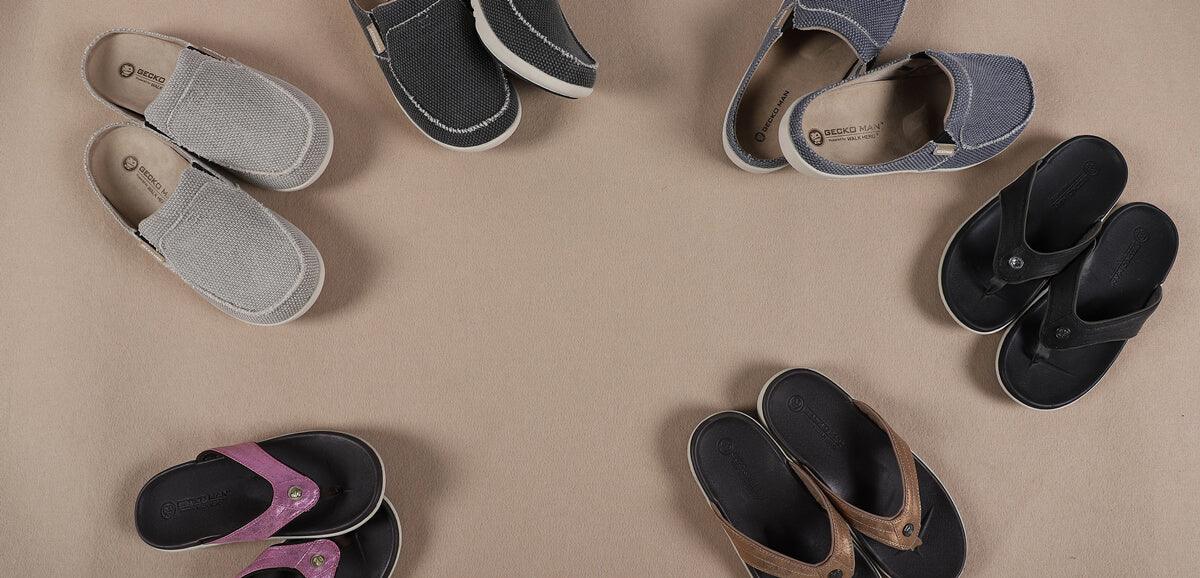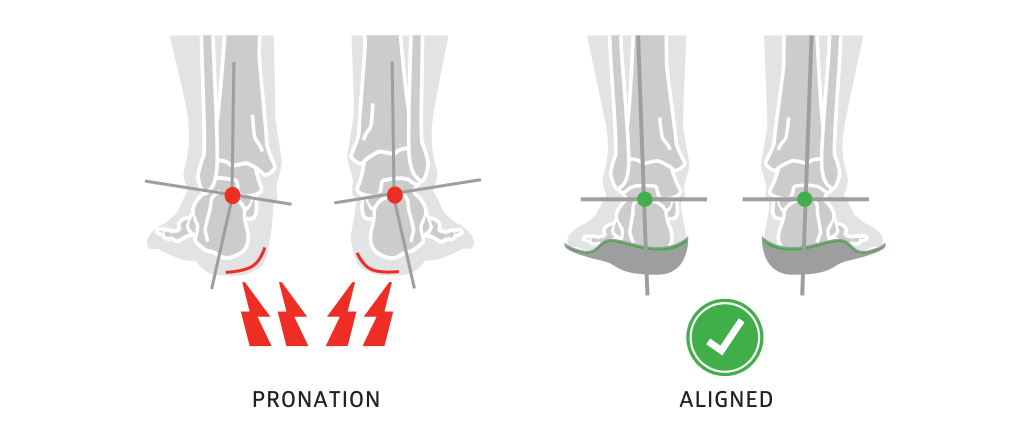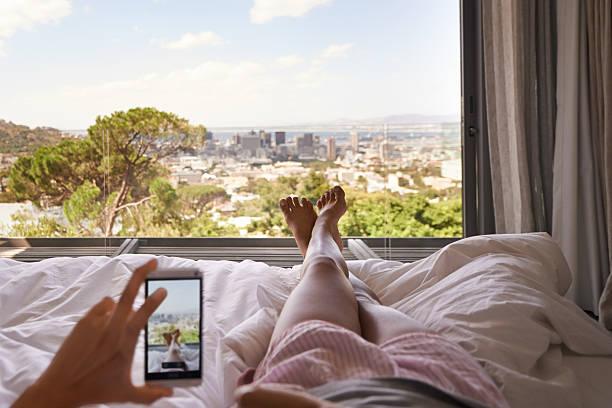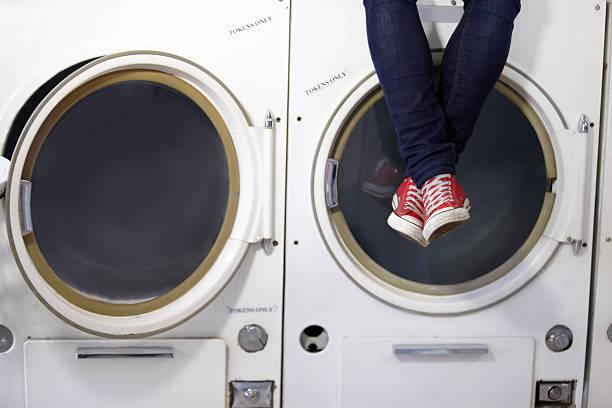Arch Support Shoes: Design to help relieve common foot pain

Geckoman Arch Support Shoes are engineered with unique features and an advanced design to provide unsurpassed comfort and pain relief. Premium Orthotic Insoles with anatomical arch support control overpronation and help ease the stress on the joints of the foot, knees, hips, and lower back.
Ergonomic soles with a mild rocker design and help propel the foot forward with minimal joints motion and add spring to your step. Soft, smooth interior, padded with foam enhances comfort and offers excellent protection for sensitive feet and for those with diabetes, neuropathy, and arthritis.
Wide toe box and extra depth design offer extra room for wide feet. Soft, stretchable uppers ease pressure on the bunions. Non-binding upper design in the area of the bunion eliminates pressure on bunions. Soft, foam-padded interior eases pressure on bunions and enhances comfort. Premium orthotic insoles with anatomical arch support align the foot properly and straighten the big toe.
Contoured orthotic insoles provide support under the arch and effectively align the feet with the lower body. Soft, cushioned materials cradle the foot and provide relief for tired and aching feet making comfortable walking shoes and arch support slippers. Stretchable, non-binding uppers conform to your specific foot shape and enclose the foot in soft, padded foam making these good walking shoes.
Orthopedic Protection For Sensitive Feet
Geckoman orthopedic footwear features the Gecko-Cushion System™ with premium orthotic insoles that properly align the foot, reduce overpronation, providing instant pain relief for over 80% of users. The soft, seam-free interior of these orthopedic walking shoes eliminates pressure points and abrasion, offering superior protection for sensitive feet.
The cushioning, ergonomic sole of the orthopedic comfort shoes is engineered with a mild Rocker that reduces impacts and significantly improves the ease of walking. Extra-depth and a wide toe box ensure a comfortable fit, extra room for toe movement, and ample space for wider feet or custom orthotics. Stretchable, non-binding uppers offered in many Geckoman orthopedic shoes eliminate pressure on bunions and hammertoes and sensitive feet.
Wide Room and Extra Depth Cup
All Geckoman shoes are made with extra depth and a wide toe-box. The extra depth offers a relaxed, non-binding fit and accommodates a custom-made orthotic. The wide & roomy toe-box provides room for toe movement and enhances comfort for those with bunions, hammertoes Morton's neuroma & swollen feet. Geckoman shoes are engineered with unique features and therapeutic detailing to help facilitate mobility and offer the ultimate comfort and protection for sensitive feet.
Wide toe box and extra depth design offer extra room for wide feet. Soft, stretchable uppers ease pressure on the bunions. Non-binding upper design in the area of the bunion eliminates pressure on bunions. Soft, foam-padded interior eases pressure on bunions and enhances comfort. Geckoman Premium orthotic insoles with anatomical arch support align the foot properly and straighten the big toe.
Flat Feet People Love The Arch Support
Geckoman's flat foot shoes feature premium orthotic insoles with anatomical arch support that prevent the foot from rolling inwards, stabilizing the foot and improving foot function. Firm heel counter along with wide soles increase stability and help prevent overpronation. The lightweight, ergonomic soles of these walking shoes for flat feet feature a mild rocker design that reduces impacts and adds spring to your step.
Protective interior lining cradles the foot in foam to reduce pressure and friction while creating a relaxed, comfortable fit. The wide toe box with extra depth in these flat feet shoes provides ample space for the toes and accommodates custom orthotics.
Geckoman offers a wide variety of flat feet shoes that provide unsurpassed comfort, support, and pain relief.
Arch Support Shoes For Foot Pain
There are many reasons we might experience foot pain, from aging, being overweight, standing for too long, and wearing ill-fitting shoes to medical conditions such as arthritis and diabetes, and specific foot conditions like hammertoes, plantar fasciitis, Morton's neuroma, and more.
The cause of the foot pain will determine specific treatment, but it can involve any of the following: medication, physical therapy, strengthening and stretching exercises, wearing specially designed orthopedic foot pain shoes, or orthopedic insoles and surgery.
Prevention involves following common-sense measures such as protecting the feet with orthopedic shoes for foot pain, avoiding activities that are extreme or high impact, maintaining a healthy weight, and stretching the feet.
Geckoman shoes for foot pain feature premium orthotic insoles, engineered with arch support that prevents the foot from over-pronating, easing stress on the joints of the foot and helping alleviate foot pain. The firm heel counter of these foot pain shoes stabilizes the entire foot and helps control overpronation.
Ergonomic soles with a mild Rocker design and cushioning midsole soften every step you take and ease the pain on the foot and heel. When looking for the best shoes for painful feet, Geckoman offers extraordinary shoes for sore feet that will keep you comfortable and pain-free.
Arch Support Shoes For Heel Pain
Heel pain is typically felt on the underside, or back of the heel, and can range from mild to extremely painful. It also has a range of causes, the most common being plantar fasciitis, the main cause of heel spurs. A heel spur is a calcium deposit that causes a bony-like protrusion on the underside of the heel bone.
Heel spurs usually start at the front of the heel, but they can extend all the way to the arch of the foot. Although heel spurs are often painless, they can cause a lot of heel pain. The pain can be intermittent or chronic, and inflammation sometimes occurs at the point of the spur's formation.
What causes it?
While sprains, strains, and fractures can cause heel pain, most heel pain is caused by repetitive stress or pounding on the heel rather than by a single injury. Certain foot conditions such as heel spurs and Achilles tendonitis can also cause heel pain, as can certain medical conditions such as arthritis and diabetes. In addition, abnormal walking gaits, flat feet, obesity, and ill-fitting shoes can also cause heel pain.
How are heel spurs prevented and treated?
Heel pain caused by heel spurs, unlike other foot conditions, may not respond well to rest since the pain is often at its worst when first getting up in the mornings. The best treatment for heel spurs is stretching exercises, shin splints, pain-relief medication, corticosteroid injections, and physical therapy.
Special men's orthopedic shoes for heel spurs or men's orthopedic shoes for heel pain and heel pain insoles that help correct biomechanical imbalances have also proven very effective in helping to treat heel spurs and heel pain.
Since the purpose of shoes for bone spurs is to reduce strain on the plantar fascia and alleviate heel pain and heel spur symptoms, shop for men's heel pain shoes that provide good cushioning, which helps reduce impacts on the heel.
Special men's orthopedic shoes for heel spurs or men's orthopedic shoes for heel pain and heel pain insoles that help correct biomechanical imbalances have also proven very effective in helping to treat heel spurs and heel pain. Since the purpose of shoes for bone spurs is to reduce strain on the plantar fascia and alleviate heel pain and heel spur symptoms, shop for men's heel pain shoes that provide good cushioning, which helps reduce impacts on the heel.
Geckoman shoes for heel pain feature Premium Orthotic Insoles that support the arch, reduce strain on the plantar fascia and heel, making them the ideal heel support shoes. Cushioned, ergonomic soles that are featured in these heel spur shoes help propel the foot forward, reducing heel pain and adding spring to your step.
A wide toe box with added depth creates a pressure-free environment that allows maximum range of motion for the toes. Geckoman offers a wide variety of styles of heel pain shoes, designed to maximize comfort from heel to toe.
Arch Support Shoes For Hip And Knee Pain
The knees and hips are the largest joints in the body, and they must work in close coordination to provide the mobility needed for walking, running, jumping, kneeling, and squatting. They also support the body's weight during all of these activities.
Pain in the knees and/or hips can lead to inflammatory conditions such as bursitis and tendonitis. Hip pain can occur on the inside of the hip or groin as well as on the outside of the hip, upper thigh, or outer buttock. Knee pain can occur at the front, center, side, or back of the knee.
What causes knee and hip pain?
Knee and hip pain result when the tissues and muscles that surround the joints become too tight, triggering inflammation, limited movement, and strain. Both too much activity, such as high-impact sports, and too little activity, such as sitting for prolonged periods of time, can cause knee and hip problems.
Injuries and arthritis can also cause knee and hip pain. In addition, certain foot conditions such as hypermobile feet (when the joints in and around the feet move more than they should) and fallen arches can cause knee pain. Still another possible cause of knee and hip pain is over-pronation of the feet.
Overpronation can cause the hip to become unaligned, and the leg to rotate inward toward the opposite leg, forcing the knee to flex and extend in a way that places too much stress on the joint. In fact, just about any problem with the foot or ankle can result in a compromised posture or gait, which can lead to knee and hip pain.
How are knee and hip pain prevented and treated?
Regular stretching (at least 10 minutes a day) is critical to both preventing and treating knee and hip pain. Strengthening the calf, gluteus, hamstring, and quadriceps muscles is also crucial to prevention and treatment.
Avoiding high-impact sports, but staying active is important as well. If you sit a lot during the day, make sure you get up and move every 30 minutes and, if possible, take daily, 15-30 minute walks.
Also, a physical therapist can examine your walk and posture and help identify the root cause of the problem. Furthermore, if you have been diagnosed with a dysfunction of the foot or ankle, making sure that you wear the very best men's shoes for hip pain and/or the best men's shoes for knee pain is an important step toward treating the problem.
When shopping for these shoes, whether you want the best men's athletic shoes for knee pain, the best men's sandals for knee pain, or the best men's dress shoes for knee pain, etc., the shoes should have the following qualities: a good fit (not too tight or too loose); supportive cushioning, and ergonomic soles.
Lastly, look for orthopedic shoes with the best arch supports for hip pain and the best men's shoe insoles for hip pain. Good shoes for hip pain can significantly reduce discomfort at the hip and improve mobility.
Arch Support Shoes For Plantar Fasciitis
Lightweight ergonomic soles feature a minimal heel-to-toe drop, evenly distributing shock forces to substantially reduce heel pain in Geckoman plantar fasciitis shoes. The Anatomical Orthotic Insoles in these unique walking shoes for plantar fasciitis include multiple cushioning layers to support and cradle the foot in comfort and alleviate strain on the plantar fascia and heel.
Geckoman shoes for plantar fasciitis come with a wide toe box and extra depth throughout the shoe, providing ample room for unrestricted toe movement. When looking for good shoes for plantar fasciitis shop Geckoman, the brand that offers a large selection of orthopedic shoes for plantar fasciitis with superior plantar fasciitis support and comfort.
Arch Support Shoes For Arthritis
Arthritis is not a single disease; there are in fact, over 100 different types of arthritis. Generally speaking, however, when we say arthritis we are referring to joint pain or joint disease. It is characterized by painful inflammation and stiffness of the joints. The most common type of arthritis is called osteoarthritis, often thought of as wear-and-tear arthritis since it is a result of years of stress on the joints.
Over time, the cartilage at the end of the bones wears away, leaving the bones to rub directly against each other, which causes pain, stiffness, and swelling. There is also inflammatory arthritis such as rheumatoid arthritis and psoriatic arthritis.
Inflammatory arthritis is the result of an immune system gone awry; the immune system attacks the joints with uncontrolled inflammation and causes joint erosion and other physical problems. Gout is another type of arthritis and is considered a metabolic issue. It is a result of too much uric acid in the system, which eventually builds up and attacks the joints.
What causes it?
The cause or causes of arthritis vary depending on the type, but some possible causes are traumatic injury, abnormal metabolism, immune system dysfunction, bacterial and viral infections, certain medications, genetic makeup, and even bowel disorders. People of all ages, races, and gender can get arthritis.
Different types of arthritis affect the joints differently, but most people with arthritis most commonly suffer from arthritic feet, hands, wrists, elbows, shoulders, knees, ankles, jaw, and neck.
How to prevented and treated?
While there is no sure-fire way to prevent arthritis entirely, you can do things to delay or reduce its effects such as maintain a healthy weight, exercise, refrain from smoking, eat a healthy diet, stay active while avoiding injuries, and stretch. Regarding treatment options, they are varied and numerous, but their objective is the same: to minimize pain and further damage to the affected joint or joints.
These options include taking pain-reducing medications, physical and occupational therapy, using shin splints or other aids for the joints, and wearing proper arthritis footwear, whether walking arthritis shoes for men, men's arthritis athletic shoes, men's arthritis sandals, or other types of shoes for arthritic feet. For the best men's shoes for arthritic feet, make sure they include orthotic insoles with ergonomic soles for proper anatomical support, excellent cushioning, and soft uppers.
These options include taking pain-reducing medications, physical and occupational therapy, using shin splints or other aids for the joints, and wearing proper arthritis footwear, whether walking arthritis shoes for men, men's arthritis athletic shoes, men's arthritis sandals, or other types of shoes for arthritic feet. For the best men's shoes for arthritic feet, make sure they include orthotic insoles with ergonomic soles for proper anatomical support, excellent cushioning, and soft uppers.
Arch Support Shoes For Back Pain
Back pain can be felt in both the lower and upper back and its severity can vary greatly. For some people, it is simply an annoyance and for others, it is excruciating and debilitating. Back pain can start suddenly or slowly and worsen gradually. It can come as a dull, constant ache, or as a sharp pain, making any movement painful and difficult.
Sometimes the pain can radiate from the back on down the leg to the foot. It usually causes decreased range of motion and diminished flexibility in the back. Back pain is also one of the most common reasons people see a doctor and are absent from work.
What causes it?
The most common causes of back pain are strain and structural problems. Strain is usually due to lifting heavy objects or lifting them improperly, sudden, awkward, or jerky movements, sports injuries, or overactivity. Structural problems include anything from injuries to problems with the disks (the areas of tissue that cushion the space between the vertebrae), abnormalities of the skeleton, such as scoliosis, and loss of bone density.
An oft-overlooked cause of back pain is foot problems. When the feet roll too far inward toward the arch of the foot, and hyper supination, where the feet are rolled outward, can lead to hip and back problems.
How to prevented and treated?
Standard prevention measures include following proper technique for lifting heavy objects, or avoiding lifting heavy objects altogether, improving posture, and strengthening core muscles. Other treatment measures include pain-relief medication and wearing specially designed back pain shoes for men with orthopedic insoles that decrease over-pronation and improve body posture.
The best men's shoes for back pain should also have ergonomic soles that provide excellent cushioning, which works to minimize impacts on the lower back. People with back pain should also avoid wearing worn-out shoes, high-heeled shoes, and shoes that are too tight or too wide, as they can aggravate foot pain and cause gait compensation.
Geckoman Premium orthotic insoles with anatomical arch support prevents the foot from rolling inwards, re-align the foot, leg, and back posture. Cushioning soles absorb impacts, softens every step you take, and prevent much of the shock from getting to the lower back. Firm heel counter along with wide soles increase stability and help control overpronation.
Final Words
Whether you're shopping for men's shoes or women's shoes, comfortable stylish shoes that keep up with the current style trends should be a priority. What if you could have all that, with supportive arch support technology to relieve aching feet and pain from plantar fasciitis or heel pain?
At Geckoman, our shoes for women and men provide arch support technology in the most up-to-date styles. Walk-in comfort when you slip into a comfortable pair of shoes with arch support from Geckoman.





Leave a comment